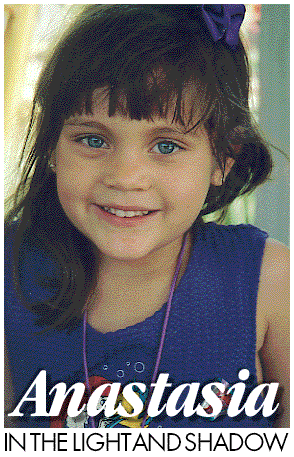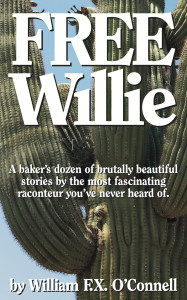 A Ramblin’ Gamblin’ Willie story
A Ramblin’ Gamblin’ Willie story
The very first thing she said to me was, “I’m Anastasia.”
She had pronounced the name ‘Anna-stay-juh’ but I took care to be more formal. I nodded gravely and said, “‘Ah-nah-STAH-ziuh’. I’m honored.”
She giggled delightedly. “Why’d you say it that way?”
“To lilt, to laugh, to dance, to dream. To fly, to sigh, to sing, to speak. To embroider the air, to perfect it with the perfect sound: ‘Ah-nah-STAH-ziuh’.”
She giggled again and that was answer enough.
She was four-and-a-half on the day we met. Not awfully, terribly short, but at no risk of scraping her head on anything. She had a round little face that had borrowed too much mischief to be cherubic but was angelic nevertheless. Her hair was brown and it was almost always almost everywhere; it was obviously brushed and tied and obviously instantly disarrayed by her mischievous wanderings. She was a beautiful child, beautiful inside and out, but her eyes were the crowning glory of her nobility. They were bluer than blue, deep and dark and purple, as purple as the crest of a dynasty. They were clearer than any gemstone, and they seemed not to reap the light but to sow it. For all the days I knew her, I could never see enough of those purple gemstone eyes.
“What’re you doing there?” she asked. I was sitting in the shade of a little olive grove reading a book. She was standing on something behind the block wall of the property next door, just her head and shoulders above the wall.
“House-sitting. You know what that means?” She shook her head and her hair flew into a more advanced state of disarray. “It’s like baby-sitting only easier.”
“Why’re you doing it?”
I shrugged. “The official answer is, I’m helping out a friend. The unofficial answer is, TV, refrigerator, hot and cold running everything. Does that make any sense to you?”
It might have or it might not, but we’ll never know, because she changed the subject. “I have a kitten. His name is ’Sputin.”
I said, “Rasputin. Somebody likes Russian names. Say it: ‘Ra-spyoo-tin’.”
“Why?”
“Just say it. ‘Ra-spyoo-tin’.”
She said, “‘Ra-spyoo-tin’.” Her voice was high and sweet. And breathless of course. Her speech was good, but she had a tendency to thrust her words soundly through her upper lip. The tongue is a fearsome sword, but it takes time to master.
I said, “Children must learn to enunciate. Can you say that word? ‘Ih-nun-cee-ate’.”
She said, “‘Ih-nun-sate’.”
“‘Ih-nun-cee-ate’.”
“‘Ih-nun-cee-ate’.”
“That’s it. Say it again.”
“‘Ih-nun-cee-ate’.”
“Bravo! Well done. First you crawl, then you walk, then you run. If you work at it, you can master anything.”
“Why?”
‘Why?’ is a dangerous question from a four-year-old. It may be a sincere request for more information and it may be nothing more than a doorstop to keep the conversation open. I said, “The purpose of mastery is mastery. The purpose of excellence is excellence. Can you say ‘excellence’?”
“Sure I can!”
“Well say it.”
“Excellence.”
I said, “Excellent!” and she giggled.
“I have to go,” she confided. “I’m s’posed to clean up.”
“‘Suh-posed’.”
“‘Suh-posed’,” she replied.
I said, “‘Ih-nun-cee-ate’.”
She scrunched her face up in a scowl.
“Say it.”
“What for?”
“To lilt, to laugh, to dance, to dream. To fly, to sigh, to sing, to speak. To spin like a ballerina on the tip of your tongue, to glide across the universe and embroider the air with breathtaking sound.”
She laughed from her belly. “You’re silly!”
“You just figured that out?”
The next afternoon she announced her presence at the top of the wall by declaiming, “‘Ih-nun-cee-ate’.”
I nodded. “How do you fare, fair Empress?”
“You said the same word twice.”
“Homonyms. Words that sound the same but mean different things. ‘Hah-mow-nim’. Say it.”
“‘Hah-mow-nim’.”
“That was homonimble of you.”
“What’s that mean?”
“It’s a made-up word. When you master the words, you get to make up words of your own. It’s called wit, deservedly or not.”
I’m pretty sure that flew past her, but it didn’t matter because all she wanted to do was chat; comprehension wasn’t a grave necessity. And that kind of chatting about words set the pattern of our days, me in the olive grove and Anastasia at the top of the wall. The afternoons were never very hot and the evenings were never very cold and, even though the pollen from the trees made my eyes water, the air smelled so green and pure and that little girl’s eyes were so alive with the light of life that I couldn’t think of any more enjoyable way to spend my time.
And you might think it odd that a little girl should tolerate so much word play, but the simple truth is that the prize children prize is a grown-up’s full attention, and they don’t care how it comes wrapped. For an adult, play requires a site, a uniform, equipment and a long list of rules. But a child needs no more than the sword of her tongue and the shield of her smile to conquer the vast empires of the imagination, to plunder abundance and always leave behind her more treasure than she could ever haul away.
“‘Ah-nah-STAH-ziuh’,” I said one afternoon. “Do you know the story of the first Anastasia, the little girl who had your name first?”
“I get to see the movie when I’m bigger.”
“Yeah, it’s kind of scary. There’s a mean old man named Rasputin, like your cat, and he makes people think he’s a sorcerer. But the little girl isn’t scary, even though a lot of scary things happen to her.”
“What things?”
“What really matters is that she gets lost, and she’s so young that she forgets all about her family. She’s a princess, an empress, and a lot of people hope that someday she’ll claim her empire.”
“Does she?”
I shrugged. “It’s just a story. The real Anastasia died in 1918 with the rest of her family. But people like to tell that story because it makes them think that the most remarkable, wonderful things can happen anywhere.”
She gazed upon me with a regal certainty. “They can.”
“I agree completely. It’s the difference between royalty and nobility. Royalty is just a pose, just a costume. But nobility shines through everything, through the most wretched squalor ever known.”
“What are you talking about?”
“Every man a king, my Empress. Every fair maiden a fair princess in disguise. I never met an ignoble baby. Can you say ‘igg-no-bel’?”
“No.”
“Hardly anyone can. But all the babies are noble, as noble as a kitten, as noble as a wolf cub. Warriors in their way and champions of justice, if only of their own. Sovereigns who cannot conceive of an alternative to sovereignty and masters of all they survey. But somehow the crowns and the crests of nobility erode away and all that’s left are scared little people chasing after the costumery of royalty, begging for something to kneel to. Do you want me to teach you something very noble to say?”
She nodded solemnly.
“This is the most noble thing I can think of for any human being to say: ‘Do your worst. I will not kneel.’”
She said, “Do your worst. I will not kneel.”
“That’s right. Just the words, no special emphasis. Nobility triumphs when it fearlessly faces tragedy. And that, my Empress, is the most remarkable, wonderful thing that can ever happen…”
Late one afternoon I said, “I know a very hard word. You want to try it?”
“Sure.”
I said, “Chiaroscuro. ‘Key-are-es-kyoor-oh’. Say it.”
“‘Key-are-es-kyoor-oh’.”
“Excellent!”
“‘Key-are-es-kyoor-oh’,” she said again.
“What are you teaching my daughter?” a woman’s voice asked from the other side of the wall.
“It’s just words, mama.”
“Whatever for?”
Very primly, very clearly, very precisely, Anastasia said, “The purpose of mastery is mastery.” To me she said, “What’s it mean?”
“What?”
“‘Key-are-es-kyoor-oh’.”
“It’s the interplay of light and shadow. In pictures, in paintings – but sometimes I think it means the conflict between good and evil, right and wrong. We have pictures and we have words and we have songs and poems and stories, and that’s a testament to the triumph of the light, don’t you think?”
She shrugged and that was answer enough.
One day when the fall had come to pay a call upon the olive trees Anastasia climbed to the top of the wall to tell me she was moving away.
I bit my lower lip and blinked very fast, surprised at myself.
“What’s the matter?”
I smiled a tight little smile, a smile for keeping things in. “This never happened before. It’s always me who goes away, not the other way around.”
“Aren’t you leaving soon?”
“Couple of weeks. You’re right, of course you’re right. It’s just new, that’s all.”
And of course it took forever. I can bug-out in three minutes flat, but it took Anastasia’s family days and days to pack up and go. She came to the wall to talk to me every day and it was so nice and so awful, sweet words embroidered around a black crepe deadline.

This is one of the stories collected in the free book FREE Willie. Get yours today!
I held her tiny little hands in mine and said, “Ingenuous. Can you say it? ‘In-jen-you-us’.”
“‘In-jen-you-us’. What does it mean?”
“It means a lot of things – open and honest and artless and innocent. But what it really means is to be born free. It means to be born without being required to kneel. That’s what you are, Anastasia of the purple gemstone eyes. Born free. The hard job is to stay free.”
“Do your worst,” she intoned with a regal delight. “I will not kneel.”
I kissed her on the forehead and she climbed into the back seat of the waiting car and sailed forth to claim her empire.















